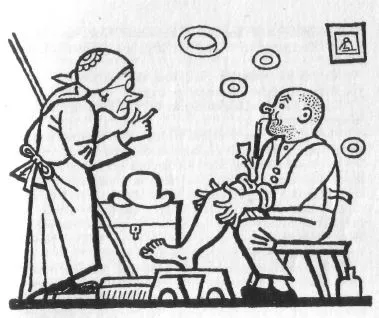The Good Soldier Svejk
THE GOOD SOLDIER:
SCHWEIK
JAROSLAV HASEK
Translated by PAUL SELVER
Illustrated by JOSEPH LADA
Copyright 1930 by Doubleday & Co., Inc.
Republished 1962 by arrangement
AUTHOR'S PREFACE
A great epoch calls for great men. There are modest unrecognized heroes, without Napoleon's glory or his record of achievements. An analysis of their characters would overshadow even the glory of Alexander the Great. To-day, in the streets of Prague, you can come across a man who himself does not realise what his significance is in the history of the great new epoch. Modestly he goes his way, troubling nobody, nor is he himself troubled by journalists applying to him for an interview. If you were to ask him his name, he would answer in a simple and modest tone of voice: "I am Schweik."
And this quiet, unassuming, shabbily dressed man is actually the good old soldier Schweik; that heroic, dauntless man who was the talk of all citizens in the Kingdom of Bohemia when they were under Austrian rule, and whose glory will not pass away even now that we have a republic.
I am very fond of the good soldier Schweik, and in presenting an account of his adventures during the World War, I am convinced that you will all sympathize with this modest, unrecognised hero. He did not set fire to the temple of the goddess at Ephesus, like that fool of a Herostrate, merely in order to get his name into the newspapers and the school reading books.
And that, in itself, is enough.
CONTENTS BOOK I
CHAPTER I
Schweik, the Good Soldier, Intervenes in the Great War Page 3
CHAPTER II
Schweik at the Police Headquarters Page 13
chapter m Schweik before the Medical Authorities Page 22
CHAPTER IV
Schweik Is Ejected from the Lunatic Asylum Page 29
CHAPTER V Schweik at the Commissariat of Police Page 34
CHAPTER VI
Schweik Home Again after Having Broken the Vicious Circle Page 42
CHAPTER VII Schweik Joins the Army Page 53
CHAPTER VIII Schweik as a Malingerer Page 60
CHAPTER IX Schweik at the Detention Barracks Page 77
CHAPTER X Schweik Becomes the Chaplain's Orderly Page 94
CHAPTER XI
Schweik Accompanies the Chaplain to the Celebration of Mass
Page 116
CHAPTER XII Religious Debate Page 126
CHAPTER XIII
Schweik Administers Extreme Unction Page 132
CHAPTER XIV Schweik Becomes Batman to Lieutenant Lukash Page 147
CHAPTER XV The Catastrophe Page 183
BOOK II
CHAPTER I
Schweik's Misadventures on the Train Page 197
CHAPTER II Schweik's Anabasis Page 213
CHAPTER III Schweik's Adventures at Kiraly-Hida Page 257
CHAPTER IV Fresh Tribulations Page 388
CHAPTER V From Bruck-on-the-Leitha to Sokal Page 304
BOOK III
CHAPTER I Across Hungary Page 341
CHAPTERr II At Budapest Page 368
CHAPTER III From Hatvan to the Frontiers of Galicia Page 386
CHAPTER iv Quick March Page 416
BOOK I

1.
Schweik, the Good Soldier, Intervenes in the Great War.
"So they've killed Ferdinand," said the charwoman to Mr. Schweik who, having left the army many years before, when a military medical board had declared him to be chronically feebleminded, earned a livelihood by the sale of dogs—repulsive mongrel monstrosities for whom he forged pedigrees. Apart from this occupation, he was afflicted with rheumatism, and was just rubbing his knees with embrocation.
"Which Ferdinand, Mrs. Muller?" asked Schweik, continuing to massage his knees. "I know two Ferdinands. One of them does jobs for Prusa the chemist, and one day he drank a bottle of hair
oil by mistake ; and then there's Ferdinand Kokoska who goes round collecting manure. They wouldn't be any great loss, either of 'em."
"No, it's the Archduke Ferdinand, the one from Konopiste, you know, Mr. Schweik, the fat, pious one."
"Good Lord !" exclaimed Schweik, "that's a fine thing. And where did this happen?"
"They shot him at Sarajevo with a revolver, you know. He was riding there with his Archduchess in a motor car."
"Just fancy that now, Mrs. Muller, in a motor car. Ah, a gentleman like him can afford it and he never thinks how a ride in a motor car like that can end up badly. And at Sarajevo in the bargain, that's in Bosnia, Mrs. Muller. I expect the Turks did it. I reckon we never ought to have taken Bosnia and Herzegovina away from them. And there you are, Mrs. Muller. Now the Archduke's in a better land. Did he suffer long?"
"The Archduke was done for on the spot. You know, people didn't ought to mess about with revolvers. They're dangerous things, that they are. Not long ago there was another gentleman down our way larking about with a revolver and he shot a whole family as well as the house porter, who went to see who was shooting on the third floor."
"There's some revolvers, Mrs. Muller, that won't go off, even if you tried till you was dotty.
1 comment